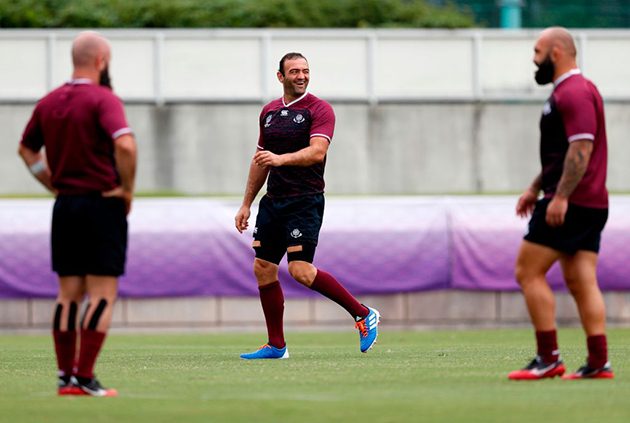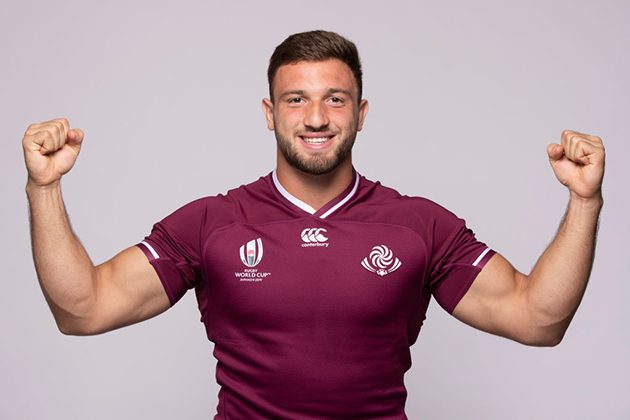The No 8 is fast becoming a crucial player for the Lelos – look out for him in Japan
Get to know Georgia’s Beka Gorgadze
Mamuka Gorgodze is the most famous rugby player to come out of Georgia, but there’s a new kid on the block who could see his famous nickname tweaked to ‘Gorgadzilla’. The different vowel in Beka Gorgadze’s surname is not the only area where the two players contrast – we’ll get onto the younger man’s skill-set later – but they are both talismanic figures on the pitch.
Four years ago, Gorgadze, then just 19, was part of Georgia’s World Cup training squad alongside Gorgodze, and while he didn’t make the final cut for the tournament in England, he did get to play in three Tests alongside his childhood hero over the next two years. “I played eight, he was seven,” Gorgadze says. “It was a massive honour for me to study next to him and I learnt a lot.”
Back in 2015, the older man was instrumental in Georgia making history in automatically qualifying for the next World Cup by finishing third in the pool. This year, while Gorgodze has made a surprise return to the squad for the World Cup, his near-namesake will also be a key figure as the ‘Lelos’ strive to do the same in Japan. The 23-year-old doesn’t possess the same raw power as Gorgodze, but he stands out as a leader.

Back in the fold: Mamuka Gorgodze (centre) during Georgia training in Japan (Getty Images)
“There’s no doubt Beka has certain qualities that endear him to players following him – a) his personality, b) his skill-set,” says Georgia coach Milton Haig. “He’s a smart player and a very intelligent man. He has great humility and doesn’t let success cloud who he is. If you look at his character, he’s the type of guy you can build teams around.
“He’s a different type of player to Mamuka. I’m sure Mamuka won’t mind me saying Beka has more skills and is the type of guy we think would make it in Super Rugby. He’s not as big and abrasive and doesn’t have the same out-and-out strength as Mamuka, but he’s a skilful player and definitely has those leadership qualities.”
Haig also pays tribute to Gorgadze for putting in such strong performances last season after a year-long injury absence. He needed three operations after tearing ligaments in his ankle in May 2017 but returned to start six of Georgia’s eight Tests in 2018-19 and Haig describes his comeback as “phenomenal”.
It was another injury that saw Gorgadze find his niche at No 8. He followed his cousin in swapping the round ball for the oval one when he was seven after an age-range change meant he could no longer play in the same football team as his friends. After stints at fly-half and centre for his local club Kharebi in the city of Rustavi, he moved to the front row and played there until his mid-teens, when a back problem arose.
“I was trying to prop in the scrum and couldn’t because I’d hurt my back,” recalls Gorgadze, who pays tribute to the influence of his mother after his father died in 2000. “I didn’t need surgery but I had to do special exercises for my back and was put on a diet to lose 6kg (nearly a stone). I then grew 6cm in three months, so the next season I played in the back row.
“My favourite position is No 8. The strategy is often for me to be on the edge, taking high balls and running back. I like the technical stuff – high balls, skills – as well as the physical game.”
It’s fitting that Gorgadze names Kieran Read as one of the players he admires for the Kiwi fulfils a similar role for the All Blacks: positioned in the wide channels to use his power and ball skills to bust defences and create opportunities. Duane Vermeulen is another Gorgadze namechecks, while acknowledging he cannot replicate the brute force that is central to the Springboks No 8’s game.
Gorgadze, who plays his club rugby in France and joined Bordeaux-Bègles from Stade Montois last year, is a powerful ball-carrier but there is also an athleticism to his play that suits the modern game. Graham Rowntree, who has been working as Georgia’s forwards coach for the past year, is a big fan.

In attack: Beka Gorgadze carrying strongly against Spain (Getty Images,)
“I call him ‘Rock Star’,” chuckles the ex-England and Lions prop. “He’s one hell of an athlete and an exceptional player – you forget how young he is.
He picks things up very quickly, is very dynamic, a good footballer and a hard worker. He’ll be a star of world rugby.”
Gorgadze is already making indents into the wider rugby consciousness. Last autumn he was named alongside Sam Underhill and Justin Tipuric in the back row of The Telegraph’s Team of the Week for his performance in defeat against Italy – his first Test for 20 months.
One passage of play late in that match encapsulates Gorgadze as a player. He catches a high ball on halfway, deftly avoids putting a foot in touch and then surges forward. He floors Italy wing Mattia Bellini with a huge hand-off, steps around one defender and offloads out of a tackle by another. Had Georgia’s handling later in the move been better they would have scored a try.
Related: Rugby World’s 100 Best Players in the World Numbers 90-81
That’s the range of skills he brings to Georgia’s World Cup campaign. Gorgadze says that the target is “two wins minimum”. That should see them finish third in Pool D, which also features Australia, Fiji, Uruguay and Wales, and thus qualify for RWC 2023. Regardless of what happens in Japan, the growth of the sport in Georgia means the Lelos will remain one of the coming forces in the world game.
“As I’ve started playing more, I’ve got more recognised on the streets,” says Gorgadze. “It’s now the first sport for us in Georgia and everyone is happy we’ve had some success. When I started rugby, there were only four children training in the morning group. Now there are hundreds of boys and girls playing.
“It’s a massive honour to represent your country and it’s also a big responsibility because lots of kids and parents look up to you.”
Gorgadze is a hugely impressive young man, not only in the high-level performances he produces on the pitch but his attitude off it. He can speak four languages – Georgian, Russian, English and French – and is aware of the bigger picture, recognising the part he plays in developing the sport as a role model. He’s even done a spot of coaching in France and says working with children has helped him as a player because it makes him look at the game differently.
This ‘Rock Star’ has the potential to be a smash hit in world rugby – look out for him on the pitches of Japan in the coming weeks.
This article originally appeared in the August 2019 edition of Rugby World magazine.
Follow Rugby World on Facebook, Instagram and Twitter.





